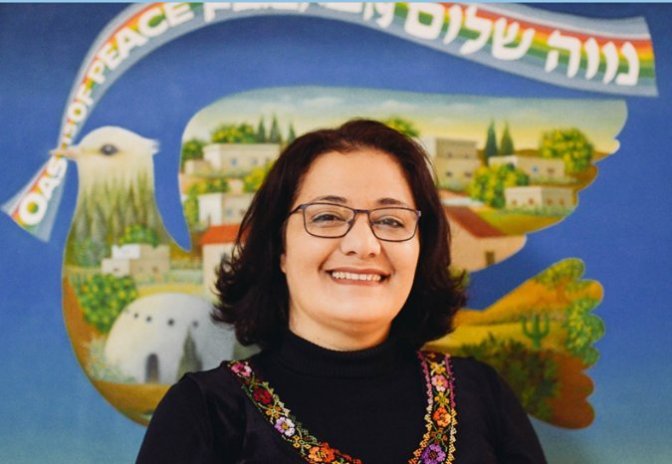Home > Oasis of Peace > Community > Interview with Samah Salaime on her appointment to the board of Hebrew (...)
Interview with Samah Salaime on her appointment to the board of Hebrew U.
Tuesday 10 September 2019

Samah was interviewed by Clarissa of the American Friends of Neve Shalom - Wahat al-Salam shortly after learning of her appointment.
“I don’t know what will happen in 3 years, but I know my ideals. I know what I represent.”
So said Samah Salaime, director of the NSWAS Department of Communication and Development, on being elected to the Hebrew University Board of Governors. She joins a star-studded crowd— former Board members include, among others, Albert Einstein and Sigmund Freud. Hebrew University, which was established in 1918, has been the alma mater of seven Nobel Prize winners and three Turing Award winners.
The appointment comes at a time in which Hebrew University is beginning to develop a more diverse and inclusive faculty. Samah, who obtained both her bachelor’s degree and Masters in Social Work from Hebrew University, explains:
“When I was here, Arab women were very much the minority. Most of the Arab girls I knew came from a local neighborhood and went home every night, so they were a little bit separate from the rest of us. Now there are a lot more Arab students— and educators, which is incredibly important. Hebrew University has its first Arab Dean in the Faculty of Law and its first female Dean of Social Work, Dr. Khoury-Kassabri. There is still a long way to go, but the difference— it is incredible.”
Part of what makes Samah’s role so exciting to her is the potential for legislative change. “The board of governors is not faculty— it’s not a paid position.” She said. “The reason it exists is to create legislative change for the school, things that affect the entire university.”
Samah has big plans for her time on the board. Foremost among them is fostering an increased sense of belonging for Arab students, women, and other minorities on campus. “I don’t want other students to share my experience of being a minority without access to dialogue or community on campus.” To that end, Samah wants to encourage student dialogue and free speech on campus— both outside of the classroom and through partnership with NSWAS’s own School for Peace.
When asked how the people close to her responded to her appointment, Samah expressed her surprise. “I didn’t know how popular it would be!” She said. “Within a few days, I had over a thousand comments on Facebook and through email— people wishing me well, congratulating me, sharing questions and experiences. People see it as a good sign.” Among the well-wishers, there were some voices of concern. Some have worried that her appointment may be used as a smokescreen instead of a catalyst towards change. To that, Samah says “The people who know me know it would be very hard to co-opt my voice. I have big plans and hope to have partners in these endeavors— but I believe the board knew when I came in that I do not back down from a challenge.”